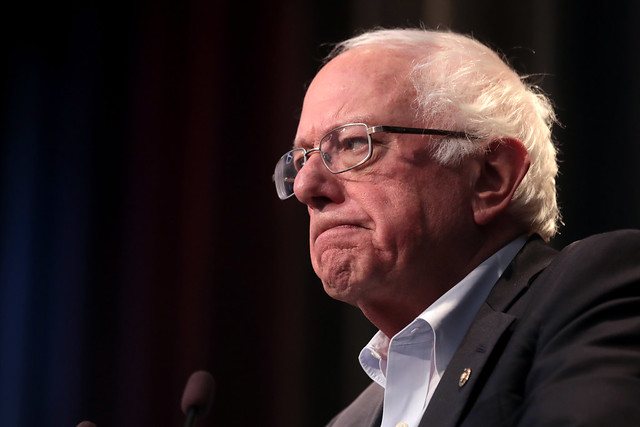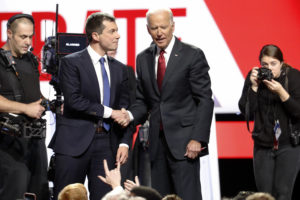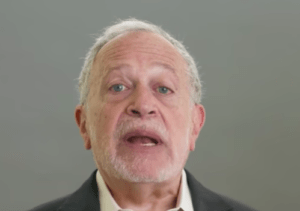Bernie Sanders Is Coming to American Journalism’s Rescue
The Vermont senator understands that the forces threatening the free press, like those eroding our democracy, are bigger than Donald Trump. Sen. Bernie Sanders, I-Vt. (Gage Skidmore / Flickr)
Sen. Bernie Sanders, I-Vt. (Gage Skidmore / Flickr)
Criticizing the media has become a sensitive issue for many on the left in the age of Trump. With an authoritarian president in office who seeks to discredit the media at every turn and regularly calls the press the “enemy of the people,” being too critical of the journalism business in 2019 can feel a bit like kicking someone when they’re down. Journalists in and beyond the U.S. not only must deal with a hostile president who attacks reporters and publications that don’t offer a steady stream of fawning coverage, but they are also grappling with the fact that their industry is in rapid decline.
At a time when journalism has never been a more essential public good, the journalism business is dying. Monthly layoffs plague the industry and newsroom employment has dropped by a quarter since 2008. More than 2,000 American newspapers have closed since 2004, and now half the counties in the country can claim only one local newspaper (while 171 counties have none at all). Meanwhile, full-time journalism jobs are increasingly difficult to come by, and for many reporters and writers today, the only certainty is the precarity of the gig economy.
With this gloomy prognosis, coupled with growing hostility toward the press, it might seem like the last thing the country needs right now is leftists railing against the media. This is apparently the attitude among many prominent beltway journalists, who have been quick to equate progressive critiques of the corporate media with Trumpian attacks on the “fake news” media. When the country’s most famous democratic socialist, Bernie Sanders, made a critical comment about coverage from The Washington Post a few weeks ago, for example, pointing out that Jeff Bezos owned the paper (which does seem to have a pretty clear agenda against the Vermont senator), he was labeled a conspiracy theorist and slammed on CNN for his “Trump-like attack” of the press.
This beltway backlash continued last week in an article published in the Guardian’s U.S. edition, in which author Joan Greve, formerly of The Washington Post, pondered whether Sanders’ criticism of the Post was “Trumpian” in nature. Sanders’ comments, wrote Greve, “come amid an increasing willingness among the broader Democratic presidential field to harshly criticize the press—even as violence against US journalists has escalated and the president’s hostile rhetoric of ‘fake news’ continues unabated.” To some observers, Greve reported, “it now seems the anti-media accusations of the right are being mirrored on the left, albeit not at the dangerous levels of the president.”
While it is perfectly reasonable to question whether rhetoric goes too far in certain instances, the idea that leftist critiques of the corporate media bear even the slightest resemblance to right-wing attacks on the press is laughable. Indeed, to liken media criticisms from the left to Trump’s incoherent ravings against the press betrays a fundamental misunderstanding of the left’s critique, which is grounded in a structural and institutional analysis, not paranoid conspiracy theories and authoritarian politics.
The subtitle of Edward S. Herman and Noam Chomsky’s classic study of the media, “Manufacturing Consent: The Political Economy of the Mass Media,” is pretty self-explanatory. The authors lay out how the progressive critique of the media is part of a larger critique of free market capitalism and of the corporate structure of our economy. According to this analysis, the fact that around 90% of the media in America is controlled by six corporations (down from 50 companies in the early 1980s) tells us a lot more about media bias than whether a majority of journalists personally vote Democrat or Republican.
From the left-wing perspective, it is impossible to completely separate media companies from the economic forces that drive their business. Then there’s the question of ownership; of course, there’s a big difference between activist owners like Rupert Murdoch and someone like Bezos, who avoids direct editorial interference. Sanders made just this point during the Democratic debate on CNN in late July. In response to moderator Jake Tapper’s misleading question about tax increases under Sanders’ health care plan (Tapper ignored that health care savings would offset any tax increases for the vast majority), the Vermont senator accurately predicted that “the health care industry will be advertising tonight on this program.”
It is also worth noting that this could happen only in America or New Zealand, the two countries where direct-to-consumer drug advertising is legal. Market forces and the profit motive drive most media companies today, and to say this has absolutely no impact on programming or coverage is either naive or disingenuous.
Not long after making his comment about The Washington Post and Jeff Bezos, Sanders qualified his remarks: “Do I think Jeff Bezos is on the phone, telling the editor of The Washington Post what to do? Absolutely not. It doesn’t work that way.”
With an “authoritarian-type” president “trying to intimidate the media,” Sanders explained, progressives have to be careful with their critiques, and must defend the free press at all costs.
But defending a free and independent press from authoritarian demagogues and right-wing terrorists isn’t good enough today, and sadly, the free market has proven to be an even greater long-term threat to the press than the Tweeter in Chief. The market hasn’t just put countless newspapers out of business and myriad journalists out of work; it has led to a precipitous decline in the quality of journalism, as the daily struggle for survival has forced outlets to chase ratings and clicks, sacrificing quality for quantity.
Twenty years ago, Nieman Reports published a report on how network television news had changed over the previous two decades. Up until the last decades of the 20th century, there had been no profitable news business on broadcast television. “The Big Three broadcast television networks—ABC, CBS and NBC—all covered news, but none generally made money doing so,” explained the report’s authors. “Nor did they expect to turn a profit from news programming.” “I have Jack Benny to make money,” the owner of CBS, William Paley, told news reporters in the early 1960s, who were instructed not to worry about costs.
The demand for profit from news programming arose as profits from entertainment programming began to dwindle. Suddenly, news was expected to make money, and the results were entirely predictable. One way to make the news profitable was to “make the product more entertaining,” according to Neiman Reports. This would generate higher ratings and thus higher revenues. Another part of the formula was to control spending: “The networks have, among other things, closed foreign and domestic bureaus, laid off staff, eliminated some money-losing documentary units, and curbed convention and election coverage.”
In the two decades since then, the news business has continued to transform. A kind of creative destruction has forced many traditional media companies out of business while the market has cultivated clickbait journalism. It has become harder and harder for small and independent outlets to survive, while media conglomerates have grown even more massive since the 1996 Telecommunications Act deregulated the media industry a quarter-century ago.
Last month, CBS and Viacom announced that they would be reuniting in a merger (after splitting in 2005) to form ViacomCBS. Meanwhile, AT&T acquired Time Warner last year after overcoming an antitrust lawsuit from the Justice Department, making AT&T the largest media company in the world based on revenue.
None of these trends bode well for the future of journalism, and in an editorial published last week in The Guardian, Sanders further addressed the current state of media. “One reason we do not have enough real journalism in America right now is because many outlets are being gutted by the same forces of greed that are pillaging our economy,” wrote the senator, denouncing the “corporate conglomerates and hedge fund vultures” who buy struggling companies only to slash their newsrooms, along with the television pundits who earn “tens of millions of dollars to pontificate about frivolous political gossip” as thousands of journalists are laid off.
“Today, after decades of consolidation and deregulation, just a small handful of companies control almost everything you watch, read and download,” continued Sanders. “Given that reality, we should not want even more of the free press to be put under the control of a handful of corporations and ‘benevolent’ billionaires who can use their media empires to punish their critics and shield themselves from scrutiny.”
This take, it should be clear, is not tantamount to an authoritarian or “Trumpian” critique of the media directed at journalists. Rather, it’s a democratic critique aimed at corporate executives and billionaire tycoons. Part of Sanders’ plan to fix journalism is to “boost media workers’ laudable efforts to form unions and collectively bargain with their employers.”
If elected, he wrote, he would also “reinstate and strengthen media ownership rules,” limiting the number of stations that broadcasting companies can own, and direct federal agencies to “study the impact of consolidation in print, television and digital media to determine whether further antitrust action is necessary.” The senator also called out big tech companies like Google and Facebook, which have played an outsize role in disrupting the traditional revenue model for publications.
Ultimately, Sanders and other progressives understand that capitalism is a greater long-term threat to American journalism than Donald Trump. There is no simple solution to the multitude of problems facing the journalism business today, but the fact that journalism is treated as a “business” rather than a public good seems to be at the root of all its problems.
As dangerous as Trump’s rhetoric is, journalists aren’t going to be unemployed (or underemployed) because of his threatening tweets—although this is not to say Trump hasn’t pushed for policies that would damage journalism even further.
Yet some possible solutions remain. One of the many ways to address the market’s steady erosion of journalism would be to support public funding of the media. Predictably, the Trump administration has tried to eliminate all funding for public broadcasting, even though the entire annual budget is less than what it costs the military to purchase a few aircraft.
The U.S. already has a dismal record when it comes to public funding of journalism: The average per capita spending on public broadcasting in countries from Europe to Australia was $86 in 2014, compared to $3 per capita in the United States. In Norway it is a whopping $180, and the second lowest on the list, New Zealand, still spent five times more per capita than America.
If Trump had his way and was unencumbered by constitutional restraints, he wouldn’t just eliminate the public broadcasting budget. He would crush the free press and perhaps even take control of the major news companies, just as Vladimir Putin did in Russia. Not surprisingly, Trump appears to admire Putin’s handling of pesky journalists. If Bernie Sanders had his way, he would safeguard journalism from the whims of the free market and empower actual journalists over “benevolent billionaires” and corporate executives.
If anyone still cannot tell the night-and-day difference between these two critiques, it’s quite possible he or she might be one of the lucky few pundits who earn six- or seven-figure checks as their fellow journalists fall victim to the market’s invisible hand.
Your support matters…Independent journalism is under threat and overshadowed by heavily funded mainstream media.
You can help level the playing field. Become a member.
Your tax-deductible contribution keeps us digging beneath the headlines to give you thought-provoking, investigative reporting and analysis that unearths what's really happening- without compromise.
Give today to support our courageous, independent journalists.






You need to be a supporter to comment.
There are currently no responses to this article.
Be the first to respond.